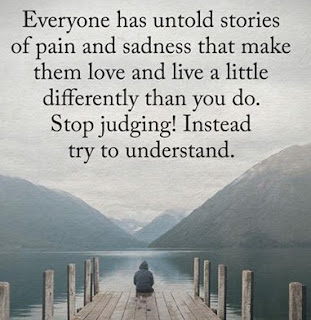On Friday I had conversations – albeit short ones – with two
professors, former colleagues of mine from the Faculty of Medicine and Health
Sciences.
In the first instance, I was asking this former colleague
of mine – being from Myanmar, if she knew of anyone who has done a study (or
studies) into the condition of the Rohingyas in her country. Or perhaps there
are people she knows I can talk (communicate) with to learn more about
them. Her reply to me was that
unfortunately, most of them do not favour the Rohingyas and may not have good
things to tell me. My answer to her was that would be perfectly okay as I
needed “to be
objective to see both sides of the situation. Not being from Myanmar may afford
me a perceived ‘bias-less’ point of view. I am also neither Muslim or Buddhist.
I have to be able to see it from both sides. It would not be good if I only “defended”
the Rohingys and forget the Rakhines. To every story, there is always at least
two sides. I want to learn more from as many perspectives as I can. At the
moment, all I am getting from the journals and the videos are how the Rohingyas
are being abused. I have not been able to find anything for the other side. So for
now it would seem like a very one-sided affair. I think that means I am not
getting a fair and objective view. So your input or that of your friends would
be helpful.”
At that moment, I realized something had changed. I started out by actually looking from the
perspective of the Rohingya Muslims forgetting to consider the story to be told
by the Rakhine Buddhist. I began to see that my search to help a group of
suffering people was not only about “helping them” and inadvertently perhaps
lending my support to them as an endorsement that the “other party” must be in
the wrong. After all, in our world of
dichotomy – there is always the villain and the hero, the victim and the
oppressor, the sinner and the saint.
Here, as I was chatting with her – without reflection and spontaneously
in responding, the words that came out of my own mouth (or in this case through
my fingers as it was an online chat) were showing me – there is another side of
the story. Do not be too quick to judge
any. If you are to help anyone – understand that there are different perspectives.
Talking with her led me to a new awareness. While I have been moved all this
while by the suffering of the Rohingyas, I had not given thought to perhaps the
suffering of the Rakhines as well. And what about the nations who appeared to
be so “heartless” in rejecting to absorb these refugees into their own country?
They too have their stories – their perspectives.
Later in the evening, a conversation with the
other professor. In response to something
I posted on my FaceBook, something I got from my reading of a journal:
"One of the
fundamental bedrocks of human rights is the principle that all human beings are
born free and equal in dignity and rights." (Journal
of Immigrant and Refugee Studies) – okok, I know this is not the proper way to
do the referencing. I am still learning and adjusting to this ridiculous
need to “conform” and be soooo structured.
Anyway – this is not an academic writing, so let me do it the way I want
to do it, ok? (hahaha) By the way, you might notice I still have some “resentment”
to being made to conform here. I am still working on that, ok? J
My conversation with him went as follows:
CS: Unfortunately it is only rarely held in word
and spirit. (his response to my posting)
Me: That's why we, collectively, need to do
something about it and not let this be just words.
CS: Easier said than done to take on the
power and might of governments and politicians. But I agree, someone has to
take a stand. The price will most probably be very heavy.
Me: Nothing
worthwhile is easy to come by, I suppose. Someone has to do it - and why should
that someone be him/her/them? Why not me/you?
CS: I suppose it is our selfishness that prevents us being the
person.
Me: Aye! Gandhi said: "Be the change that
you want to see in the world." Now you know why I am here in NZ. Not
culinary arts. My inner voice (some say is God) has led me
to where I need to be to do what I need to do. Your prayers would be most
appreciated, Prof.
CS: You always have my best wishes. You have
indeed taken an unusually bold step at this stage of your life and I realize
its significance.
Me: Can't
really help it (though we all know we have a choice). The calling within is too
strong. It has built over the years - and I am only now understanding what that
"calling" has been all this time. Experiencing an
"amalgamation" of emotions - fear, anxiety, excitement, passion etc.
But "a man has to do what a man has to do." I will trust in the path
that has been laid before me.
Again, as I was communicating with him – it dawned
on me, for this reason I am here. To learn, and there is so much to learn. Not just about the plight of the Rohingya or
the Rakhines but also many other things in life. This same principle applies.
Nothing is as it seems. Look
deeper. We all have a role to play. And
begin with non-judgment. Indeed, the lessons I am getting – the experiences,
the reading, the conversations – they are .. Opening my eyes and my heart.
Peace,
Syl
Syl



No comments:
Post a Comment